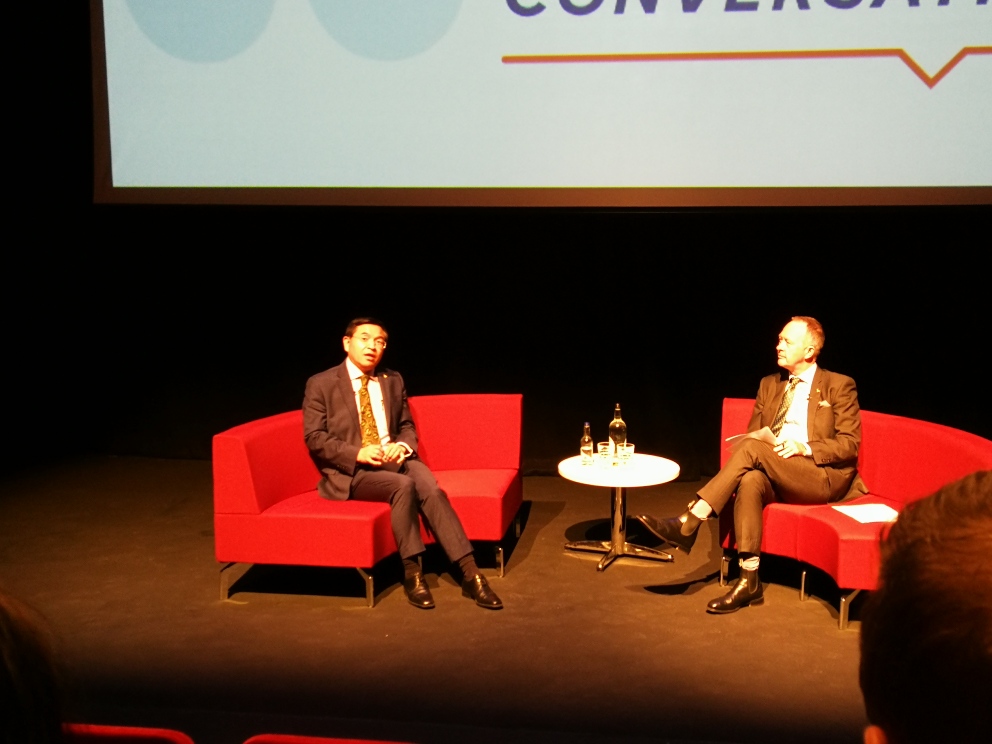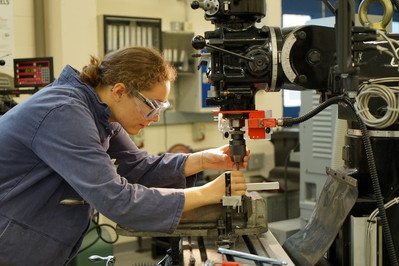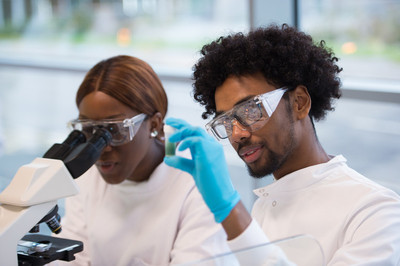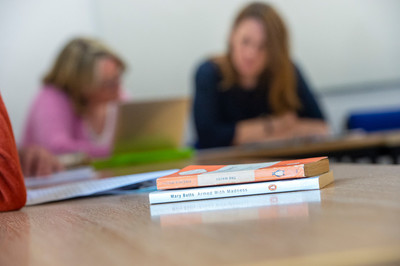My second ‘In Conversation’ rekindled my Australian connection, as host David Sampson and I found common ground in our Antipodean roots. It was a pleasure to welcome an engaged and interested audience, who brought their incisive questions and expert views to the discussion for another successful event in this series.

Our topic this time was Research & Innovation. It’s hardly anything new for Surrey: since our inception as Battersea, this institution was the place to be for meaningful research and application in relevant industries. For example, Surrey took the revolutionary step of appointing the very first professor of Hospitality and Tourism in the UK – Professor Rik Medlik – and since then, accolades like four Queen’s Anniversary Prizes, spin-out businesses like Surrey Satellite Technology Ltd, and much innovation taking shape at the Surrey Research Park all prove how adept Surrey’s teams are at turning research into outcomes.

Now, the Government’s ongoing Industrial Strategy, which has a goal of investing 2.4% of GDP in research and innovation by 2027, plus our own Research & Innovation Strategy recently launched by David Sampson mean there has never been a better time to focus on and strengthen our research environment and performance.
My own career in research began rather by surprise. For a long time, my ambition was to be a teacher; in my opinion, there was no more worthy calling. Then, as a second-year Masters student I wrote a paper that got published and – suddenly, I became inspired for a career. By the end of my PhD, I had published 11 papers. You could say I took to research!
I had decided that I would be a professor by age 35, but missed it by a year – I was 36.
Before this, though, there came another ‘Eureka’ moment when I realised that researchers could engage with industry to make a difference in solving real problems. Towards the end of my Masters, my supervisor got a call from a company in the industrial north of China that needed advice about combustion. My supervisor was too ill to travel so he sent me. I was terrified! Here I was on my own, heading off to a big company where they were no doubt expecting answers, miracles, heaven knew what from me. In fact, I spent a whole week there, working virtually day and night with six engineers to finally improve their burner design in order to fire up the new low-pollution coal-water slurry furnace. This was the state-of-the-art clean coal technology, and we achieved the first success in getting it going.
My reward: a bicycle! Actually, I was thrilled: a bicycle was a big deal back then.
Aside from an appropriately ‘clean’ mode of transport, the experience also brought home for me that hard work and curiosity are often rewarded in unexpected ways. I learned that I loved solving problems and, more than that, I suddenly saw how inspired and relevant research makes a genuine difference to real-world issues, while also advancing scientific knowledge. I was hooked.
Off I went to the University of Queensland, which I chose for the reputation of my PhD mentor Professor Duong Do – a prodigy Vietnamese Colombo scholar. He taught me to be an independent thinker. Weekly, instead of telling me what to do, he would ask me questions and probe any problems that had arisen. My PhD experience with him taught me two valuable lessons: that academic freedom is crucial; and that you must get your results out BEFORE they are perfect. Perfectionism kills ideas and strangles results! I suppose another way of expressing this is to say that research is a journey, not a destination. Your outcomes may be ready to see the light of day long before you are sure about them.

Finally, I learned that the cycle of making and testing is 99% hard work and 1% inspiration – sadly for us all, not the other way around.
In our conversation, David and I went on to discuss more broadly how research has evolved. The UK has a remarkable history in scientific discovery and endeavours – from early days of eccentric and inspired individuals pursuing curiosity-based research, to the organised team-based projects of the modern era. Research has also seen a shift from theoretical to applied, consciously aiming now at impact. On the whole, I feel this shift is a positive one.
Further, the speed of digital transformation has changed the way we do research and collaborate. We are hit with so much information so fast – but data is not the same thing as real understanding or knowledge, which are harder to achieve. Herein lies the challenge: knowledge used to be power, but nowadays knowing what to ignore is even more powerful. From my own experience, it is important to have the patience, and to use your skills, to penetrate all the superficial information and discover the meaning and substance underneath.
What about our research and innovation ecosystem? Is it robust?
In this area, I feel our scientific strength needs to be balanced by stronger entrepreneurial activity and commercialisation of invention into innovation. SSTL is a legendary spin-out that we are all immensely proud of – and yet on the global scale it is quite modest in terms of value and scale. At Surrey, we are acting now to energise the whole sector, for example by hosting activities like Falling Walls Lab and Pitch@Palace On Tour – both hugely important initiatives in support of UK innovation.
At Surrey, research and innovation are part of our dual mission: to educate the next generation and to advance and apply knowledge for the benefit of society. This philosophy links to my earlier observation about how research is brought to life through its application to real-time problems. This is our particular strength as an institution. It makes us stand out, and we have the potential to lead the world in impact!

The global ‘Grand Challenges’ really do motivate researchers; they inspire curious and determined minds, and they require that we collaborate. In this way the Grand Challenges actually serve to make the research and innovation ecosystem stronger.
The topic of the Research Excellence Framework (REF) had brought many of the audience to the conversation, and I do feel that the REF gets the balance right with its use of peer review – it’s more meaningful as an approach than counting citations. And yet somehow funding should also acknowledge the value of potential, not just reward past results. An interesting challenge for the future, then, will be to incorporate this recognition as a new assessment for funding.
Ultimately, we can aim for the UK top 20 in REF. This means more funding, higher resource levels, and hard work in the next few years! I think we are more than a match for the challenge. In this effort, our professional services can be working to ease the admin burden for researchers, our skilled advancement team are striving to raise more funds to support scholarships, fellowships and enhanced facilities, and our Research and Innovation Services team are finding ever more opportunities and training to develop all the skills that make researchers confident and effective. Early Career Researchers are the future!
To close, we had some excellent questions during the Q&A. For example, how do we ensure that it is talent that we are selecting in researchers rather than privilege or connections? This issue is of crucial importance to any research-intensive organisation like ourselves. Unequivocally, we must always build on a base of diversity and inclusivity.
Then, how do we guarantee that everyone gets the chance to develop? This happens when the research director first gets to know each student’s strengths and personality, and then organises the group in such a way that the individuals and the whole team can support, help and encourage each other – postdocs helping senior students, who then assist junior students. Essentially, we must practice a ‘whole team’ ethos where benefits and opportunities are all shared; if the individuals flourish, then so will the group and by extension the centre and the institution. And the quality of the research will reflect the richness of the research environment. My early experiences of generous supervisors meant I could create the same environment for my postdocs and students – all of whom inspired me in their turn.
Science should be bold, adventurous and not afraid of failure. We can only do this by building on a broad, supportive research community that shares, collaborates and nurtures all its members. And then we can do what takes the most courage – to keep changing direction, not staying in the same comfort zone. That’s when the real life-changing, ground-breaking discoveries and inventions are made.
I can think of no better conclusion than to quote David Sampson’s comment: ‘Surrey’s future USP should be that we are the best place to start a research career’. When I consider the strength, quality and experience of our broader research community at Surrey, I feel this ambition is well within our grasp. Our present strengths will also be our stronger future.
